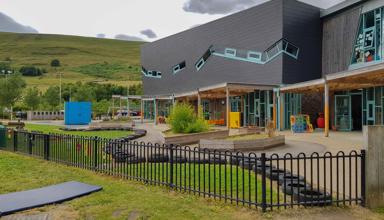The report of Professor Graham Donaldson’s independent review of the curriculum and assessment in Wales will be published today.
The conclusions and recommendations of Professor Donaldson’s report are expected to be far-reaching with the Minister of Education and Skill, Huw Lewis, commenting in Plenary on 29 January 2014 that this would be the ‘most significant curriculum reform Wales has ever seen’. The Minister also told the Children, Young People and Education Committee on 23 October 2014 (pdf600kb) that the content was ‘likely to be profound’ and ‘likely to mark a complete break with the national curriculum as we know it’.
[caption id="attachment_3206" align="alignright" width="300"] Image from Pixabay[/caption] The Research Service previously blogged in February last year about the curriculum and assessment review which is being undertaken in two phases. The first phase updates the existing curricula arrangements to align with the Literacy and Numeracy Framework (LNF). The LNF became statutory in September 2013. Following phase 1, revised Areas of Learning in the Foundation Phase and Programmes of Study for English, Welsh and Mathematics at Key Stages 2, 3 and 4 will be statutory from September this year. A Frequently Asked Questions paper from the Welsh Government (pdf151kb) explains further.
Image from Pixabay[/caption] The Research Service previously blogged in February last year about the curriculum and assessment review which is being undertaken in two phases. The first phase updates the existing curricula arrangements to align with the Literacy and Numeracy Framework (LNF). The LNF became statutory in September 2013. Following phase 1, revised Areas of Learning in the Foundation Phase and Programmes of Study for English, Welsh and Mathematics at Key Stages 2, 3 and 4 will be statutory from September this year. A Frequently Asked Questions paper from the Welsh Government (pdf151kb) explains further.
Professor Donaldson’s independent review is the second phase. When announcing details of the review on 12 March 2014, including the appointment of Professor Donaldson, the Minister, Huw Lewis, said that he wanted to do something ‘unique for Wales – to develop a Curriculum for Wales – that provides a continuum of education from the Foundation Phase to Key Stage 4’.
Whereas phase 1 of the review focused on realigning the curriculum with the substantial change brought about by the LNF, the Donaldson review concentrates more on curriculum design, looking at the content of individual subjects and their place within the curriculum. It also addresses a number of reviews, reports and recommendations that have been published in recent years, such as the ICT Steering Group’s report to the Welsh Government and the Review of Welsh second language at Key Stages 3 and 4.
According to the Welsh Government’s website, the Minister asked Professor Donaldson to articulate a clear, coherent vision for the national curriculum and assessment arrangements in Wales from Foundation Phase to Key Stage 4, linking directly to the new qualifications system. The Terms of Reference give further details.
Professor Donaldson provided an update to the Minister in October 2014 (pdf116kb) on how his review was progressing, which included ‘10 principles for curriculum design’. These were that the curriculum should be: authentic; evidence-based; responsive; inclusive; ambitious; empowering; unified; engaging; based on subsidiarity; and manageable.
He added that his final report was ‘likely to present proposals which will have significant implications for how we frame the purposes of the curriculum, for how we describe and organise its component parts and for how we assess progress in learning’.
When the Minister appeared in Committee during draft budget scrutiny in October 2014, he envisaged the degree of change would be considerable, telling Members, ‘remaking a curriculum is no mean business; this will be years of concentrated effort, right across the educational community.’
How will the teaching sector respond?
It will be very interesting to see how schools and teachers themselves react to the Donaldson review at a time of already substantial change. In a high-profile speech earlier this month, Huw Lewis said the teaching profession will be ‘critical’ to delivering on the Curriculum for Wales emerging from the Donaldson review.
The OECD observed in its review of the Welsh education system (April 2014) that ‘schools are currently facing some challenges in implementing the numerous policies and reforms’ under the Welsh Government’s improvement agenda ‘because there are so many’. According to the OECD, head teachers and stakeholders that the review team met described a risk of partial implementation or ‘reform fatigue’.
The Welsh Government has responded to the OECD’s conclusion that ‘the pace of reform has been high and lacks a long-term vision … and clear implementation strategy all stakeholders share’ through its new educational improvement plan ‘Qualified for Life’. Qualified for Life predominantly pulls together many reforms already announced or underway, setting them out in one strategy rather than introducing a whole new agenda for change for schools and teachers.
Following the publication of Professor Donaldson’s report today, the Minister for Education and Skills is due to make an oral statement in the Senedd on Tuesday 4 March.
Article by Michael Dauncey, National Assembly for Wales Research Service.






